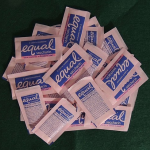The Conversation returns with another awful story about the dangers of "ultra-processed" food. Here's a look at the science they ignored—again.
Food & Nutrition
Most of my dieting or weight-conscious friends rely on the bevy of artificial sweeteners on the market to aid their quest of finding “their svelte outer selves.” For example, we have saccharin, the oldest of the bunch, sucralose, aspartame, and stevia, available in rainbow-pastel-colored packets for the asking. Is one better than the other?
Many Americans are obsessed with nutrition or totally disinterested in it. Why are these extremes so common? ACSH contributor David Lightsey joins us to explain. Public health officials committed many blunders during the pandemic. Part of the problem may have been the incomplete and often inaccurate information they were working with. How can they avoid the same errors next time around?
Recent news reports have spurred concern that just touching fentanyl can be dangerous. Let's take a look at the chemistry behind this claim. Comedian Bill Maher recently attacked the fat-acceptance movement as a danger to public health, sparking ferocious criticism on social media. Sadly, few people recognized the most important point about Maher's commentary: he was right.
Reporters have turned yet another study's underwhelming results into exaggerated headlines about the cognitive benefits of fruit consumption. Let's take a closer look at the paper in question.
Of all the world's problems, arguably the most pressing is "which Tootsie Pop flavor is the most natural?" Another would be "why is Dr. Oz's head in that picture?" A lesson on artificial flavors and people.
A recent study has reporters worried that "ultra-processed" foods accelerate cognitive decline. Don't panic just yet.
I like Marion Nestle, although I do not always agree with her point of view. She writes a food blog entitled Food Politics, and in her current article, it seems that the emphasis here is on politics rather than food.
There is no question that health, fitness, and anti-aging issues dominate our culture and have risen to a cult level of obsession for millions of people who have turned the simple task of feeding and taking care of themselves into a religious obsession.
“Consumers increasingly want to make decisions on the environmental sustainability of foods.” Are you one of these consumers? Can your food choices sustain your health and that of the planet? A new study considers the “environmental impact” of food products. As it turns out, not all foods that sustain your health will sustain the planet – we will not eat our way out of climate change.
We've been told for decades that less is more when it comes to salt in the diet. Recent research has thrown that conclusion into doubt. Can we identify children who may be at risk for SIDS before it suddenly and tragically strikes?
The FDA has released the latest results from its Pesticide Residue Monitoring Program. Activist groups are scrambling to dismiss the report.











